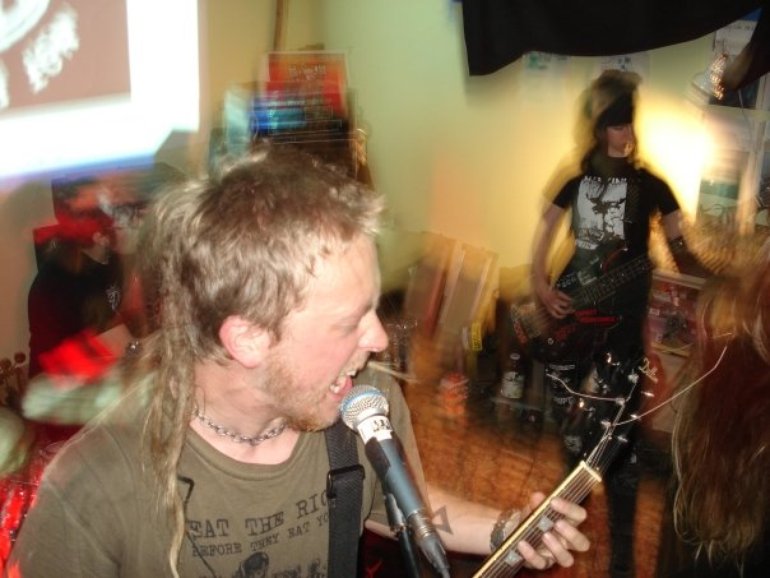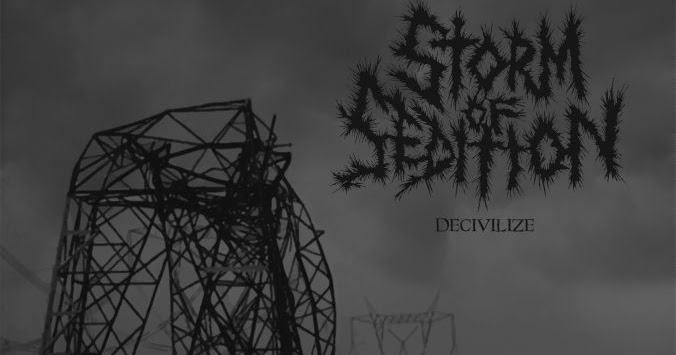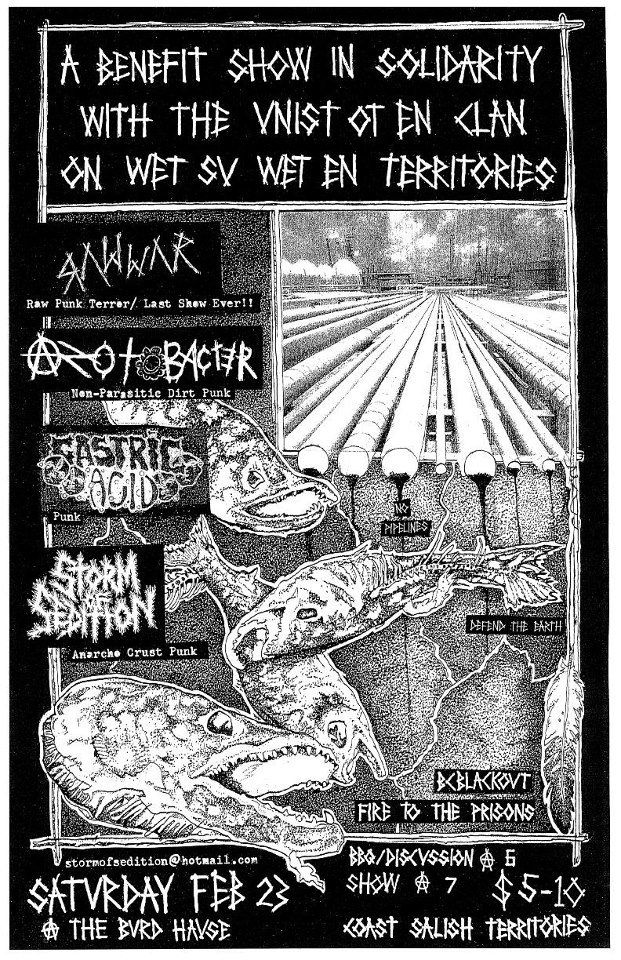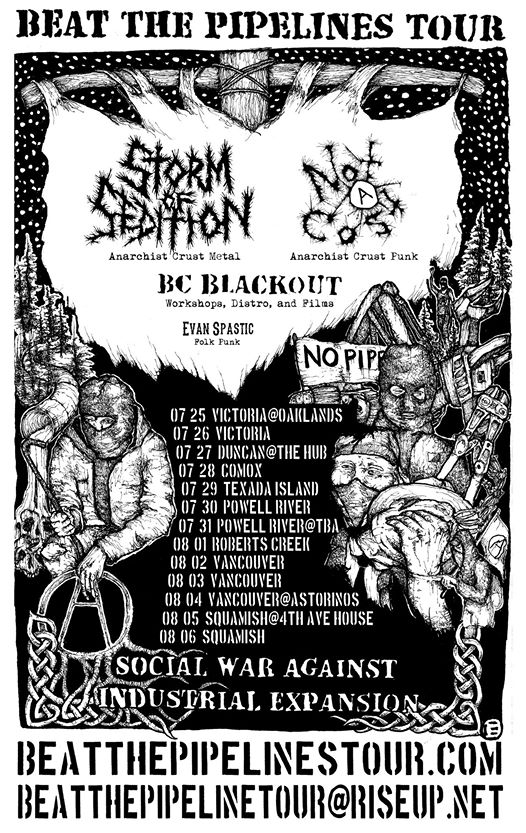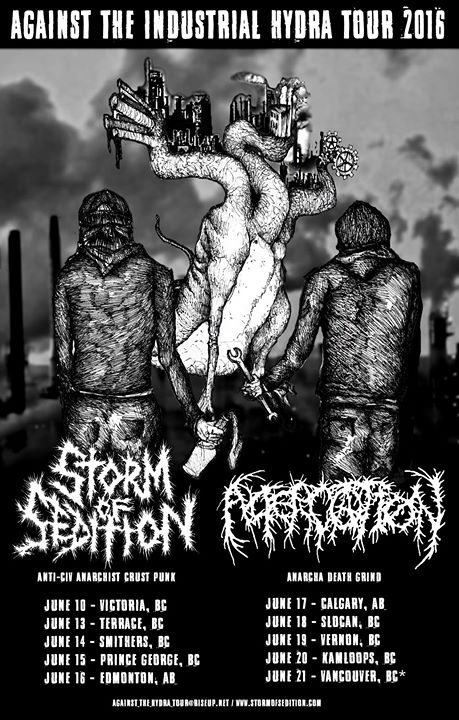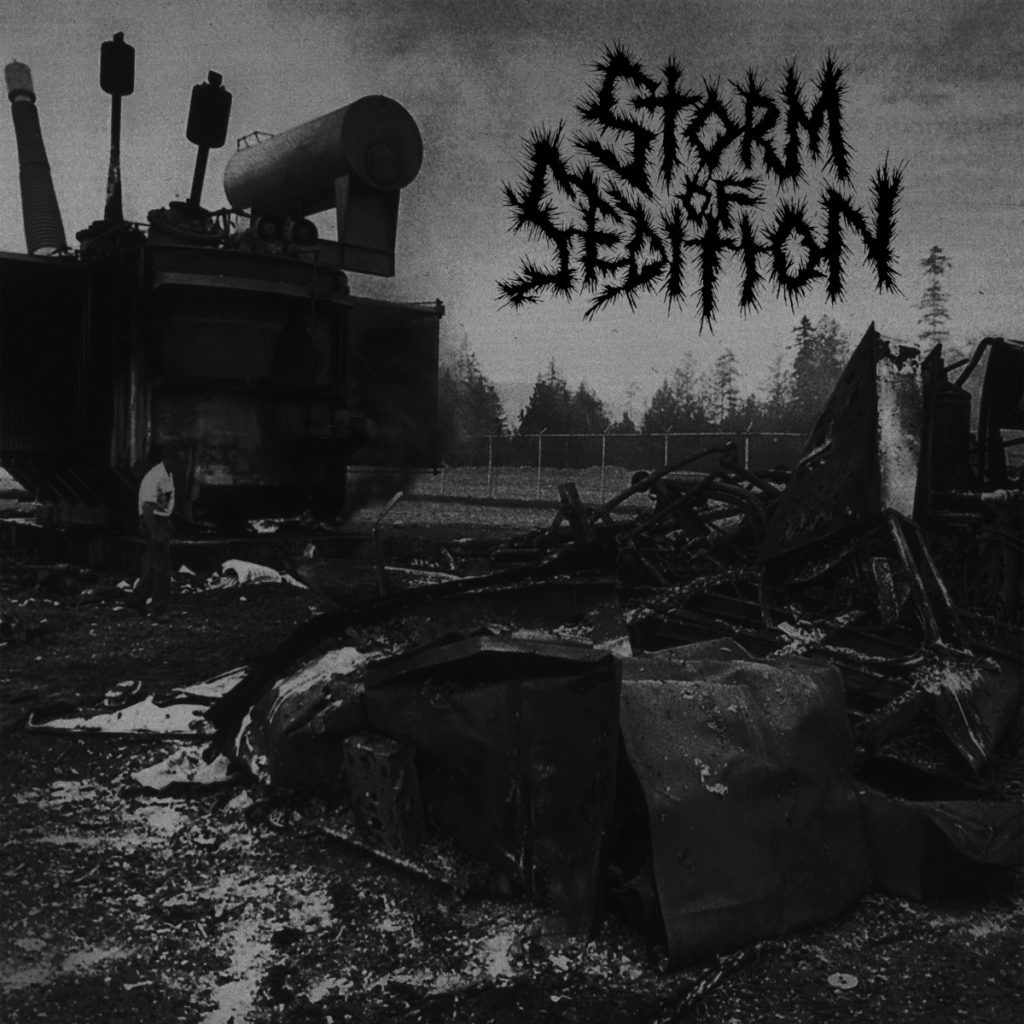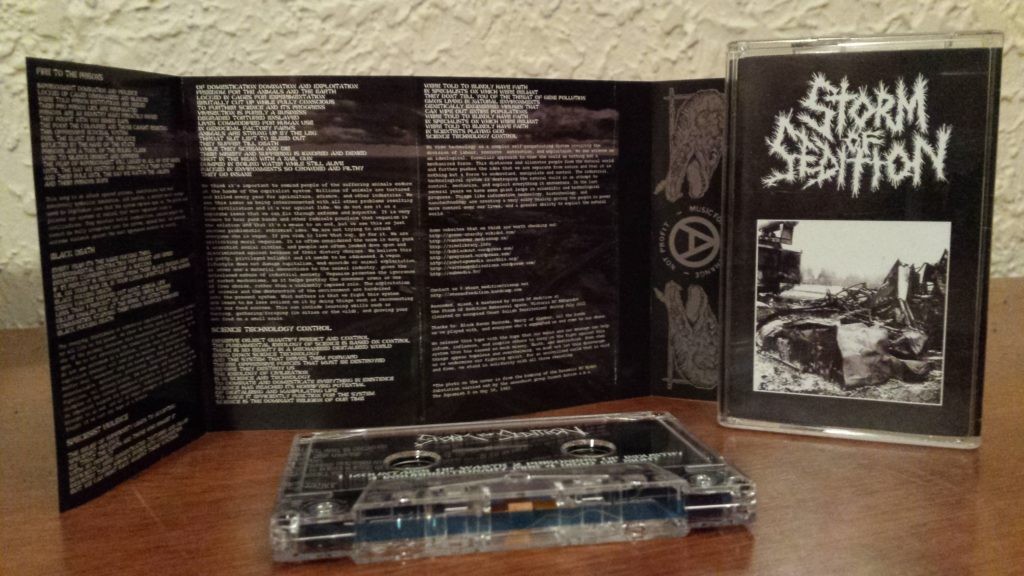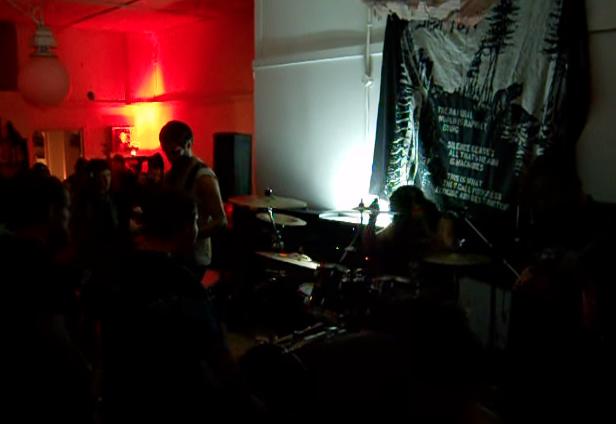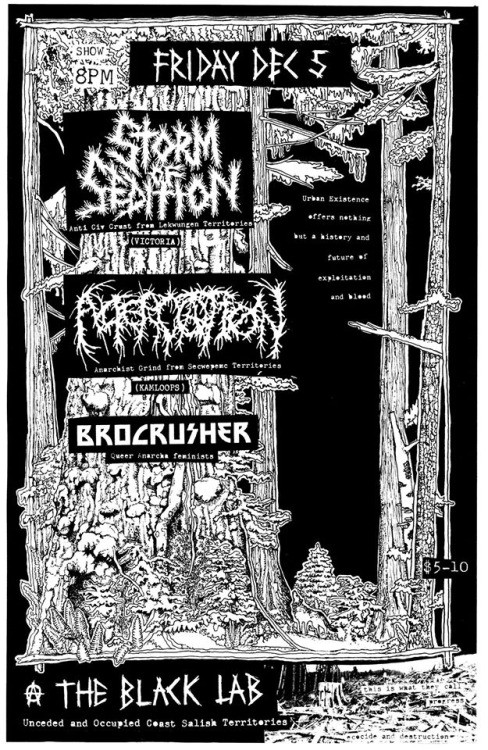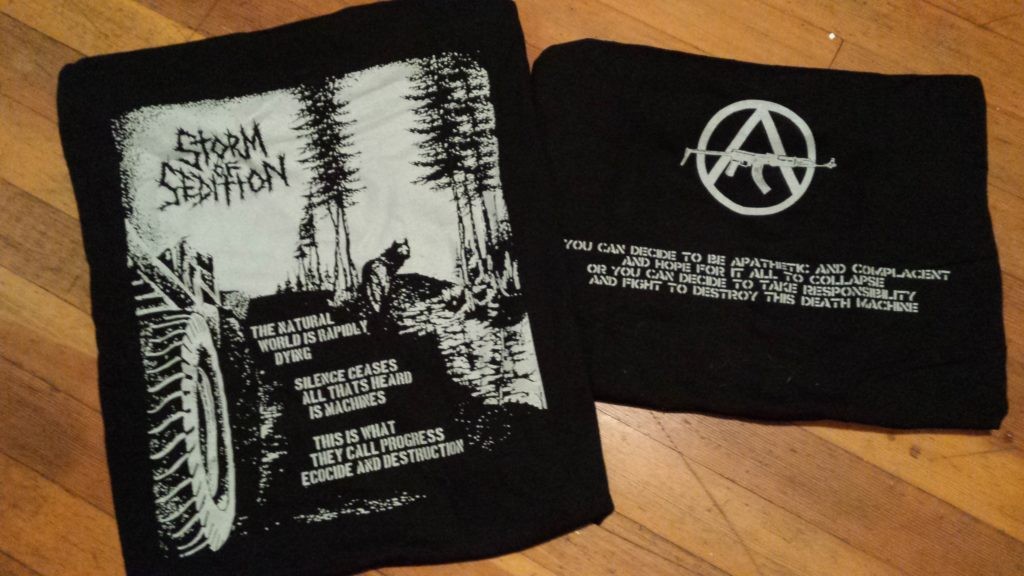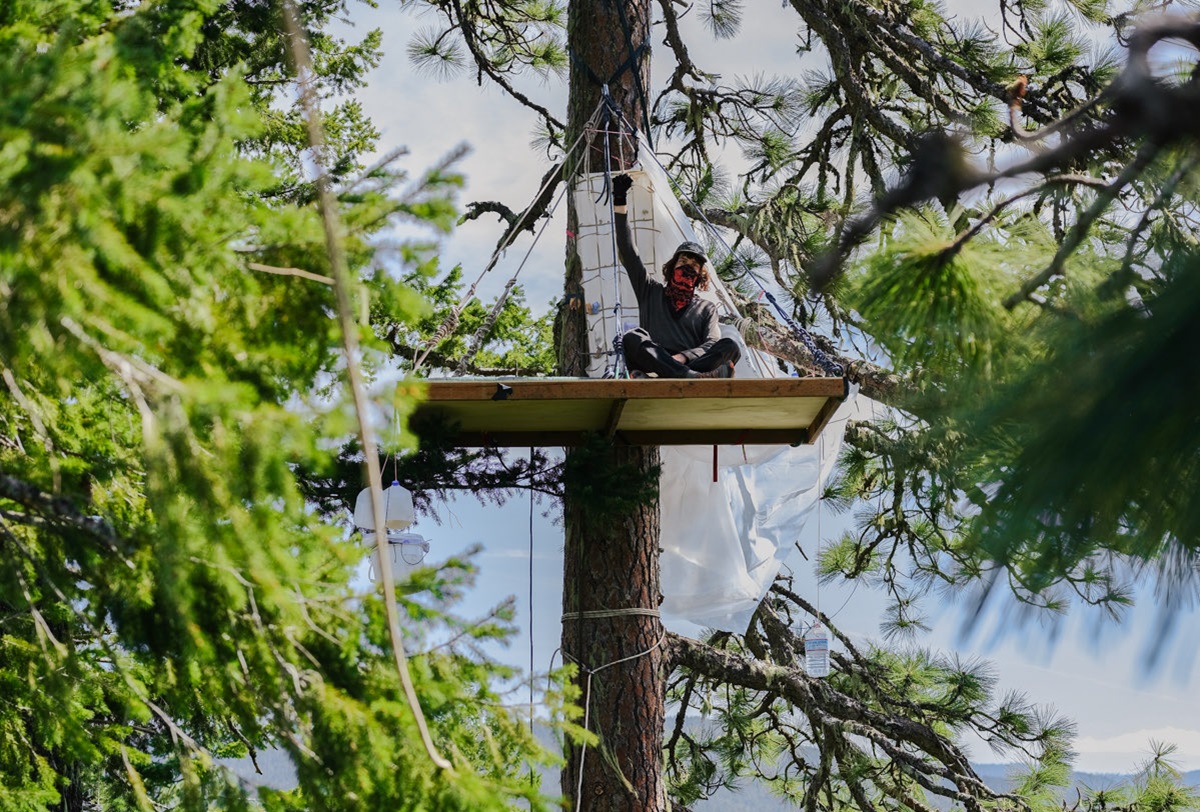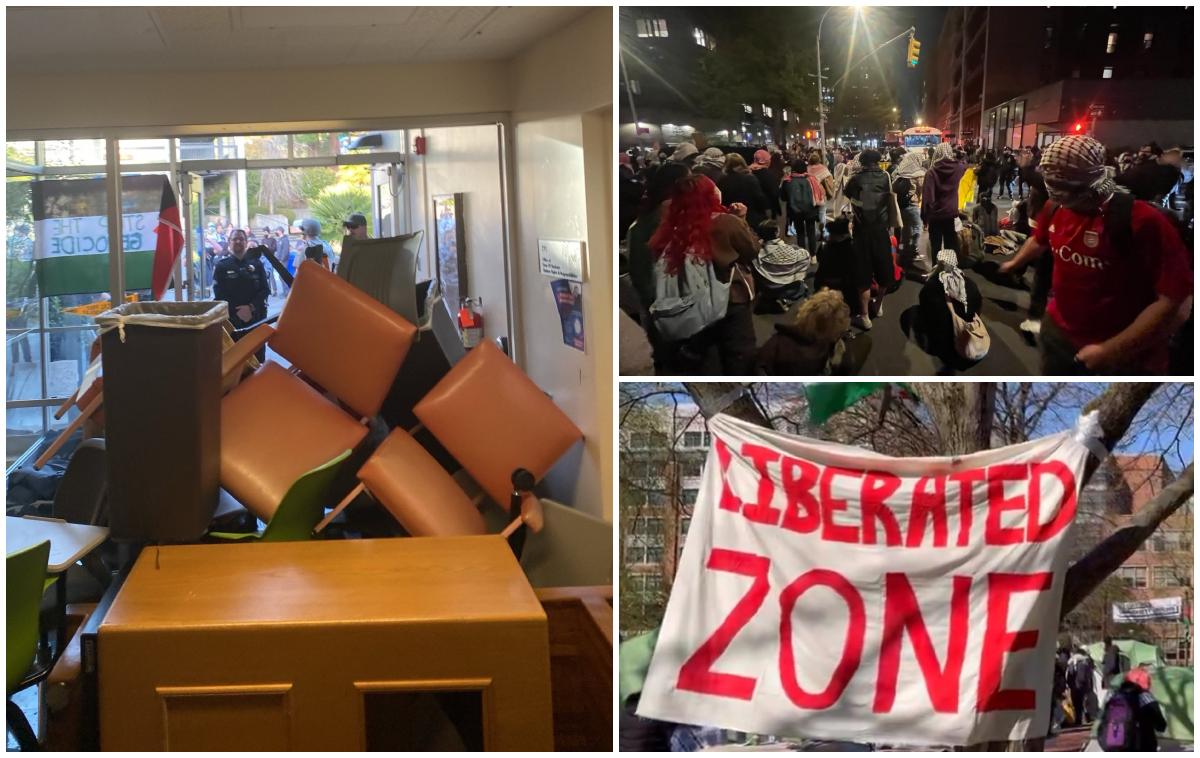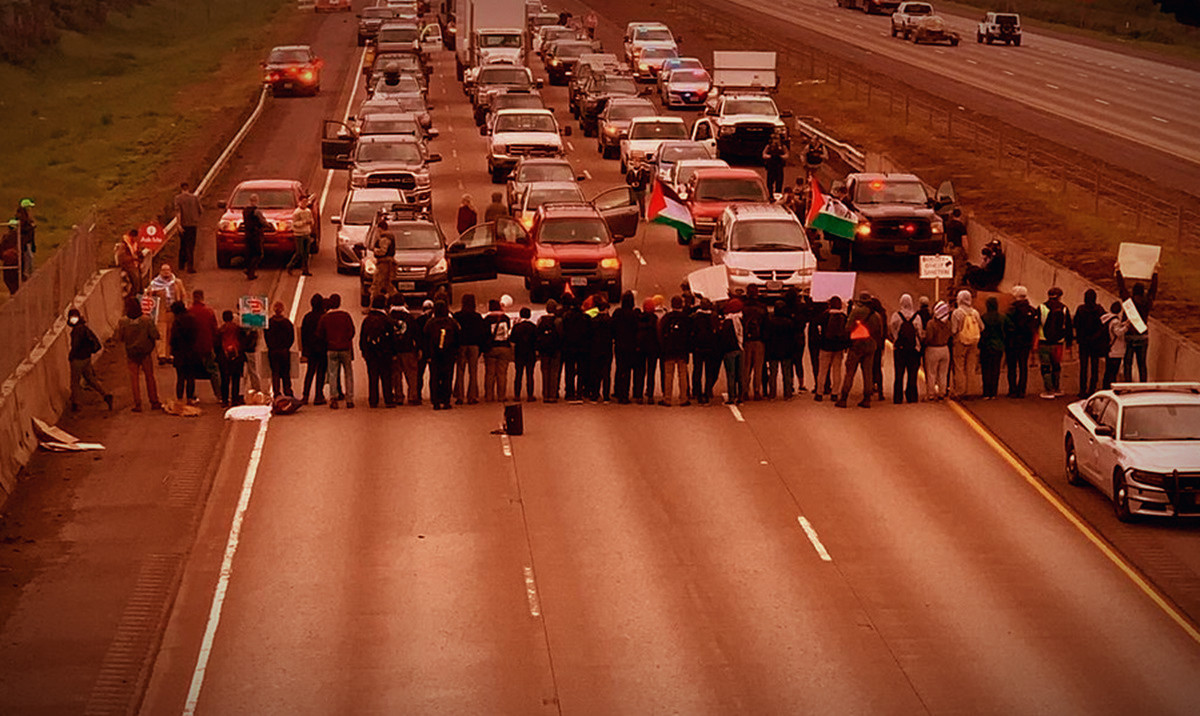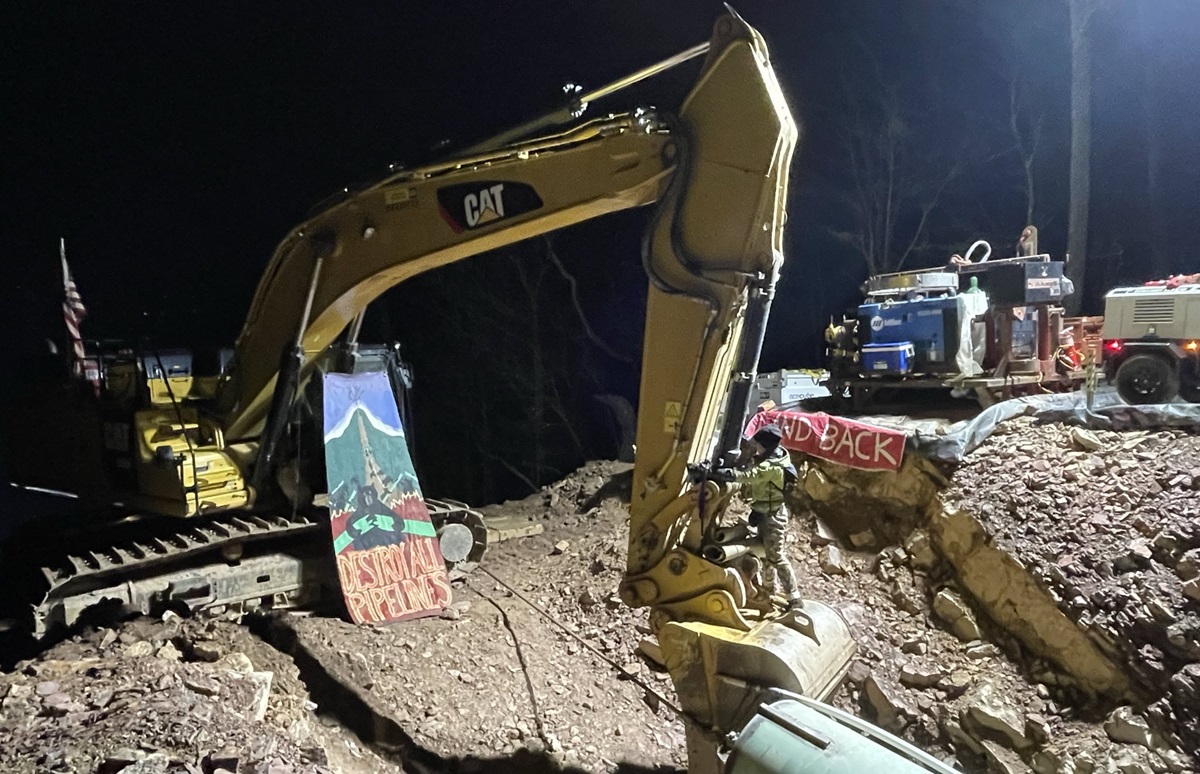Filed under: Canada, Civilization, Development, Indigenous, Interviews, Repression
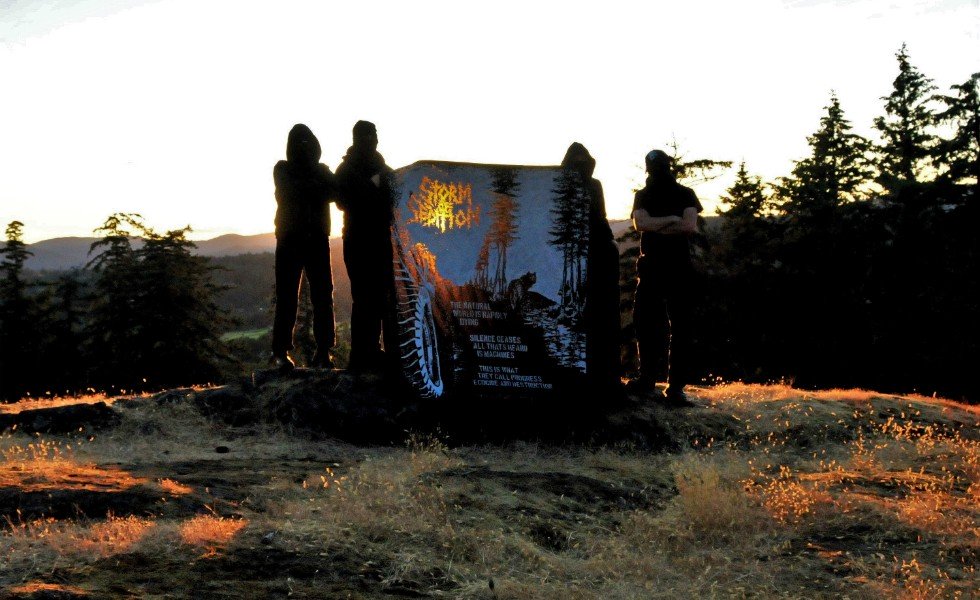
Originally posted to It’s Going Down
In the 1980s and 90s, punk bands helped to radicalize a generation of young people and spread anarchist ideas across the world. In the current period, only few punk bands seem to be picking up the torch in North America. One such band that is continuing on this tradition is Storm of Sedition, a “DIY anti-civilization anarchist crust-punk band founded in Victoria B.C. Canada (Occupied Lekwungen Territories) in 2011.” Since its inception, the band has put out numerous releases and demo tapes, including the brand new album, Decivilize, and has toured throughout Canada on the “Beat the Pipelines Tour,” which sought to bring together information about physical resistance to pipeline construction with anarchist punk music. This time around, the band is embarking on the “Against the Industrial Hydra Tour” starting this month with plans to hit the US and Europe in the near future. Wanting to know more about the band, its connection to anarchist, ecological, and indigenous struggles, as well as the anti-civilization ideas that inform it, we caught up with Storm of Sedition as they prepared to embark on their tour.
It’s Going Down: You’ve stated in past interviews that you don’t like to give out information about the members of the band due to police surveillance and harassment, both against the band in particular but also in the wider context of repression against anarchist and anti-colonial resistance. While we’ll talk about that in a bit, can you tell our readers though a little about the band, where it is based out of, the goals of the group, and also the kind of music that you play?
Storm of Sedition: We describe ourselves as an anti-civilization anarchist crust punk band, and we’re based out of Victoria BC, which is on occupied and unceded Lekwungen / Songhees Territory. We started this project in 2011 with the intention of propagating anarchist ideas in the punk scene which we felt was lacking an anarchist element. Musically, we’ve mixed crust-punk, anarcho-punk, and various forms of extreme metal.
In the beginning we were very inspired by insurrectionary anarchism, and while we still are to some degree, we’ve moved away from many of its ideas. I still appreciate its emphasis on attack. In the last few years we’ve gone more in the direction of writing songs from a green anarchist perspective with lyrical topics ranging from the methods civilization colonizes, creates, and consumes human resources starting with the processes of education and domestication, to taking a critical look at urban life and mass society and linking many social problems to this way of living.
IGD: You all come out of anarcho-punk scene that has been home to bands like Iskra (seen in picture above) and Leper (in picture below) for a long time, and SOS shares some members with those bands. Beyond anarcho-punk, I know that there is currently an established street punk/Oi! label, Insurgence Records that is specifically anti-fascist. Many people have also heard of groups like DOA and the Subhumans (the Canadian one) from the 1980’s. Many of these earlier groups helped give birth to an anarchist trajectory in Canada as discussed in the book, Direct Action, about the urban guerilla group of the same name. Can you talk a little about the history of radical and anarcho-punk in Canada? How did this help germinate anarchist ideas in the area?
SOS: Most of us aren’t old enough to have lived through decades of radical punk, so I won’t go into the history of Canadian punk as a whole, but I can talk a bit about the history of anarchist punk in Victoria. The first anarchist band I know of that started here was Black Krondstadt who were around in the early 90’s. Some of the members went on to form Iskra. In general, anarchism and punk were much more connected in the’90s. There were quite a few active anarchist punks doing projects and collectives during that time. They were involved in Earth First! actions and organizing such as the struggle to protect the Carmanah / Walbran Old Growth forests and the anti-logging campaigns in Clayoquot Sound around 1993. These were pretty big resistance movements at the time. In the early 2000’s, there wasn’t a whole lot going on as far as anarchist music in Victoria, besides Iskra until Leper showed up. Iskra has been the main long running anarchist band in the area. I think they have inspired a lot of people, including myself, they’ve really held it down.
IGD: Vancouver has faced police surveillance, repression, and crack-downs in the wake of resistance to the 2010 Olympics. More recently, there have been raids on the homes of people involved in pipeline resistance. Can you tell us more? You stated in a recent interview that the band has come under surveillance from the police; which have even sent undercover into your shows. Can you tell us this story? Did the police come in dressed to look the part?
SOS: A friend of ours, who was an active anarchist organizer in Vancouver, had their house raided twice by pigs on the pretext of being suspected of anti-pipelines graffiti. The cops proceeded to try and link all sort of other crimes to him, including vandalism and arson charges. Eventually the case was dropped. This was most likely a scare tactic and a warning to others involved in anti-pipelines resistance.
Some of the people in our band, who played in Leper, had their house under surveillance during the Olympics in 2009-2010. They were regularly followed and harassed at work, at home, and on the street. Their house was an anarchist hot spot during that time, and the police were trying hard to crack down on Olympic resistance.
During the 2014 Beat the Pipelines tour, we were made aware that an undercover cop had attended the show in Vancouver. This was confirmed after the show when a night demo was organized. People took the streets and were confronted with cops, one of the pigs was recognized as someone who attended the show earlier in the evening. They weren’t dressed like a punk if that’s what you mean, but they didn’t really stand out.
IGD: In the US, in the wake of the Green Scare, the police famously targeted anarcho-punks and crusties for surveillance in Portland and Eugene. In some ways, this repression often seems to make subcultures often less political because many people seem to not want to be connected to something with actual repercussions. What has this surveillance and police harassment done to the larger scene? Has it pushed people away or made them more resolved?
SOS: From what I’ve heard, besides being a nuisance, the police repression caused a lot of stress and anxiety among the people involved. I don’t think it pushed people away from having an anarchist orientation. Some folks have moved away from cities, not necessarily as a result of police repression, but because they didn’t want to live within the concentrations of business, work, police etc. So I think many anarchists are just trying different approaches at living lives outside of the confines of urban prisons. Many people realize that being in the heart of the beast isn’t always the best approach.
For instance, some friends of ours moved up north and are doing what they call insurgent subsistence, connecting ideas of land, subsistence, resistance and anarchy. They have also gotten involved with indigenous land defenders on Lax U’u’la (Lelu Island) against the proposed construction of a liquefied natural gas plant. Some of them are interviewed in Black and Green Review issue 3 which I encourage people to check out. But the point I was trying to get at was, I think projects like that can be more valuable than an anarchist praxis based around urban life and struggle where we have little to no chance of gaining any sort of freedom. Cities are inherently oppressive, we can never be free within them. Mass societies are synchronized and controlled. Like I already said, they are concentrations of work, commodities, and business, and within them it is clear how much power the institutions of civilization have over our lives. At least in more rural areas, I think people have more potential to create pockets of autonomy and space without institutions and laws interfering in their lives as much.
Civilizations first colonize people and annihilate their cultures and their ways of subsistence, then either kill or integrate them, and keep them reliant and captive. The process repeats time and time again. Developing a relationship with the land, gaining subsistence, self reliance, and creating direct community is in many ways an undoing of the domestication process. If people have a relationship with their land base, they will fight for it and defend it because it is their livelihood and way of life. Not to say that it’s impossible to develop some sort of relationship to an area if you live in or close to a city, its perhaps just more difficult. But to answer your last question, if police repression has pushed people away from the scene / cities, I don’t think that’s a bad thing.
IGD: You all have played a lot of benefit shows, for both prisoners and also for various groups of indigenous people. Can you tell us more about these benefits? How have these shows been an opportunity for anarchists to make connections between Native people and themselves? Is this an expression of existing bonds of solidarity or the forging of them?
SOS: We’ve done benefits for the Unist’ot’en and for the Sinixt Nation among others. We felt affinity with their struggles so we organized them as expressions of solidarity, but other friends of ours, who were also part of these events, had more direct connections with people from these camps. It’s important to mention, these indigenous resistance camps are hundreds and thousands of km’s away from where we live. Other then that, we’ve organized benefits for friends facing legal trouble as well as one for Amélie, Carlos, and Fallon, three anarchists who were imprisoned in Mexico in 2014 for an incendiary attack. In the end, we often wonder how much value doing these sorts of things have. Sometimes they feel like they’re replicating the dynamics of charity which to me is problematic and not solidarity.
IGD: Can you tell us about the tour you all went on in 2014, the “Beat the Pipelines” Tour? It featured bands, info, and workshops with the goal of pushing people to get involved in resisting pipeline construction. Can you tell us more about the tour, its scope, its goals, and did you feel it was successful in pulling people from the punk scene into active resistance to resource extraction?
SOS: Our goal was to travel around BC and talk about resistance to civilization with a specific focus on LNG and pipelines, and network with other people interested in these struggles. The idea was, if we could create decentralized, autonomous networks of anarchists throughout our regions that interact with each other, work towards common goals, and maintain solidarity, we could be a real threat. Its always difficult to talk about measuring success when it comes to things like that, it comes down to quantifying something that’s some what abstract and hard to gauge, but there were lots of great discussions that came out of it, and overall I felt pretty good about the whole thing.
There were many flaws as well. Playing extreme music in small towns that have no punk scene whatsoever isn’t always the best tactic to meet people, share ideas, and start a dialogue. There were definitely several shows with practically no one in attendance besides a few bewildered tourists that would wander by. We also went with quite a large group of people which made it hard to organize and keep it all running smoothly. Overall, I don’t think we had high expectations of what we’d accomplish, but I’m glad we went through with it.
IGD: You are about to go on a new tour entitled, “Against the Industrial Hydra Tour.” In another interview you wrote:
The main focus of the tour is to promote inspiring, subversive ideas and to spark up conversations about resisting industrialism and how that relates to an anti-civilization praxis. We think it makes sense to attack the energy infrastructure that fuels civilization, including LNG and other “green energies” that Canada’s industrial economy is attempting to move towards. We’re looking forward to going up north to communities close to Lelu Island where some inspiring resistance is going on. Indigenous land defenders are currently resisting Pacific North West LNG who are attempting to build an LNG plant in the region. This would have obvious severe and harmful implications to the ecology of Lax U’u’la (Lelu Island) & Flora Banks and the Gitwilgyots Tribe, whose territory it is.
For other bands or musicians reading this, what do you think the potential is to mix music and culture along with building capacity of human beings to fight against the systems of domination? What lessons from the pipeline tour do you think you’ll be drawing on for the upcoming Hydra tour? What’s also changed in the last two years between the tours on the ground that would affect resistance?
SOS: I don’t think there lies tremendous potential in music honestly, but I think it will always be used as a subversive tool of expression by people who need an outlet. I’m not interested in fantasizing about grand ideas of Revolution and people simultaneously coming together in some mass social movement and bringing the whole thing down. I’m more interested personally by thinking about what sort of subversive things we can do in our everyday lives, connecting with our land base, gaining self reliance and subsistence, and focusing regionally on fighting civilization. Maybe we’ll inspire some people to take action and develop some sort of anarchist practice, if we do, that’s great. I know myself, like many others were first turned on to anarchism through punk rock.
As for the tour, we’re heading out with a much smaller crew this time, which will make things easier to organize. We’re also mostly playing towns and cities that we think will have some sort of turn out, although I wouldn’t be surprised if we’re met with hostility in some of the smaller industry based places we’re playing. From my perspective, not a lot has changed since the last tour. The general public is just as fucking stupid as ever. Civilization is still here unleashing destruction on the earth, colonizing land and people, wiping out cultures, crushing freedom and autonomy. If anything, everything is only more fucked than two years ago. In our area, it seems like here there’s less momentum as far as pipelines resistance and anarchist activity goes. At least resistance is heating up and gaining momentum in other places such as with the indigenous resistance camps in Northern BC defending their territories and ways of life against industrial expansion.
IGD: One of the songs on the new album, Mechanism of Defense, reads as an indictment of Leftism in social struggles and protest movements. What inspired the song and can you tell us what it is conveying in the lyrics?
SOS: We detest Leftism just as much as any other civilized statist political ideology. The left upholds ideas of Humanism, progress, anthropocentrism, authoritarianism, moralism, scientism, and so forth. It challenges the hierarchical ways that mass society is organized and challenges social inequalities but does not, in any way, want to dismantle or fight civilization itself and challenge the root causes of the problems that we see. The left, whether radical or not wants only to re-manage the mechanisms of institutionalized power and exploitation. Civilization is reliant on managers, specialists, impersonal institutions, and overseers.
Leftists/progressives/activists play the roles of specialists who work to smooth out social problems through means of reforms, integration, and recuperation. As anti-civilization anarchists, what the Left wants is completely antithetical to what we want.
We also wrote that song as a result of being completely sick of Anti-Oppression politics and the influence its had on radical milieus. With its academic and Marxist roots, and its praxis focused on further reinforcing the social categories people are placed into in this society, we’re left with the attempts to rearrange and redistribute social privileges, language policing, and the focus on creating safer spaces. Believing this will change mass technological industrial society into a utopian, egalitarian, all inclusive progressive space is quite ridiculous. And then there’s the shaming and punishment replicating the ways of state judicial institutions (they even use the same language) and the attempts to tokenize and put less privileged people in leadership positions, attacking anyone who doesn’t fall in line or support their political agenda.The whole Anti-Oppression thing is quite nauseating not to mention dis-empowering to everyone involved, except maybe to some of the identity politicians in leadership positions. It just replicates the same old politics of representation and control. I know its commonly critiqued and criticized within the anarchist milieu, but I rarely hear people within the punk scene criticizing it, so we made a point of doing it.
IGD: You have organized tours, wrote songs, and done benefit shows for Native groups and projects. Can you talk about the outcome of all of this? What has it meant for a largely non-Native subculture to come out strongly in support of Native peoples? Have your actions pushed other bands and people within the punk scene to take on similar stances or not?
SOS: A lot of non-native activist folks, driven by guilt, approach indigenous people and their struggles and tokenize them and act without their own agency. We on the other hand were trying to encourage anarchists and other radicals to find affinity with indigenous land defenders based on sharing a mutual hatred of the colonial state, and a recognition of the importance of defending the land from the encroaching destruction endlessly unleashed by civilization. There was actually a workshop done at an anarchist bookfair here a few years ago where it was talked about how important it is to maintain our own agency and principles as anarchists when participating with native people in their struggles. Not all that surprisingly, many folks were outraged and offended that someone would question the Anti-Oppression method of being a guilty ally incapable of acting on ones own accord. That started some interesting conversations and heated disagreements, but these are important things to bring up. Many people are too scared to criticize the left and identity politics out of the fear of being shamed and ostracized from the “scene.”
IGD: Storm of Sedition plays what many would consider very extreme music. It reminds me of when I would play songs from bands like Aus-Rotten to my mom or friends. Their reaction would be, “That’s cool someone made a song about IMF structural adjustment programs, but why does it sound like Cookie Monster having a painful poop?” With all of the crucial themes you discuss in your songs, what pushes you to play music that many people would find extremely abrasive?
SOS: We never had the intention of reaching the masses. I think that’s a futile approach. We play extreme music because we like to think of it as an attack on society itself. Society being an institution, a specific, complex, mass social arrangement of people who are controlled and live by a set codified behaviors and beliefs. Not wanting our anger to be channeled into a medium that is acceptable and non threatening, we play violent sounding music because we like to think it could be a disruption, even in the smallest way. We also don’t play status quo music because it’s terrible, and using a medium such as hipster radio rock to express our anger, would come out very strange with the same lyrics we have. If someone doesn’t like it, that’s completely fine.
IGD: The band has stated that it is influenced by black metal. What is your take on the continued existence of racist and Neo-Nazi black metal bands (National Socialist Black Metal, or NSBM)? Are you seeing a rise of this in Canada? What happens if someone comes to a SOS show wearing a BURZUM shirt?
SOS: The metal scene has always been filled with idiocy. We don’t have anything to do with it, we just listen to some metal and are inspired musically by some of it. You can only play punk music for so many years before you get bored out of your mind. Black metal has always had connotations with nationalism, neo-paganism, and racism, although there are definitely some bands who have distanced themselves from these ideas. I like some of it musically, but that’s about it. If I see someone wearing a Burzum shirt, I might ask them about it, and then go from there depending on their answer. I find every aspect of civilized culture offensive, and if I went around attacking everyone who supports civilization, government, pigs etc. it would be a waste of time. Most people in Canada are patriotic and are fine with their history of colonization and genocide. I don’t think that’s much less terrible then someone interested in their European heritage and some neo-pagan closet nazi shit, or whatever the fuck bands like that sing about.
I’m sure there’s some Neo-Nazi sympathizers around here. There were a few war metal bands into that stuff around Vancouver. There’s also people that support and have put on shows for Death in June and other hipster fascist shit like that. But not being involved in the metal scene, we don’t really see a lot of this stuff ourselves. When it comes to Nazism and Fascism, we oppose them the same way that we oppose Democracy, Communism, or anything other form of state political power. These are all outcomes of civilization and the centralized power mechanisms inherent to them.
IGD: You have stated on your website and in interviews your dislike for the lack of depth or the Leftist positions of many anarchist or “political punk bands.” It seems to me that many crust, hardcore, or anarcho-punk bands simply are Discharge clones that don’t go beyond writing another, “War is Bad,” song, or simply have bumper sticker level lyrics.
At the same time, if it wasn’t for bands like Anti-Flag or the Unseen, I might not have gotten into other bands such as Conflict, Citizen Fish, or Crass, and thus, anarchism. It seems like a band like Rise Against currently has the same appeal. With punk still serving as an entry point into anarchist ideas for many young people, especially those that don’t grow up in college towns or outside of a area with an established anarchist network, space, or group, how would you address this tension?
SOS: I dislike commercial music, but if a band like Rise Against inspires some kid to look into anarchism, that’s all right. I cared more about these conversations when I was younger.
IGD: One of the things I think a band like Storm of Sedition and also Appalachian Terror Unit in the US is so exciting and interesting, is that you all are responding to things happening in your area, even though the over all focus is much greater. Are there any other bands with anarchist ideas that are doing the same that people should check out?
SOS: As far as anarchist bands in Victoria, there’s quite a solid group of people that play music. There’s Iskra, who I’ve already talked about, Not a Cost (crust punk), and Infantile Dissention (queer anarchist punk). Some other anarchist bands I know of are Altercation, raging anarcha grind from Kamloops who we’re doing our upcoming tour with, and Human Host Body who we’re doing a split with. They’re a anti-civ metal crust band from Slovenia definitely worth checking out.
IGD: What do you see as the possibilities of using punk to continue to generalize interest in anarchist ideas and actions? Are there any anarchist punk projects happening now, Profane Existence for instance, that you think are helping to build up the culture and spread the message of the bands? How do you think these formations could expand and grow? What keeps you involved in the punk scene?
SOS: We’ve surprisingly gotten a lot of support and positive feedback from people regarding Storm of Sedition. I think punk music can still be a useful tool for sharing ideas and inspiring younger folks to look into anarchist thought. I don’t know if it will ever be like it was in the 90’s with punk music and anarchism being so tightly connected. I also don’t know if striving for that is the best thing either. If that all repeated it might just seem stale, although it couldn’t be any worse then the current situation with anarchism being tightly connected to student culture.
We’re not actually that involved in the punk scene ourselves. We only play once or twice a year in our home town. We keep playing because its an outlet for us and we still enjoy it, but I have no idea how long that will last. At this point in my life I actually find punk music / culture very boring and uninspiring. The European punk scene is actually a lot more interesting, maybe if I lived there I’d be more into it. It’s more connected to squatting, anarchism etc. I’m not aware of many cool anarchist punk projects going on currently, but I’m sure there’s many I don’t know about.
IGD: You are coming to the US soon. What can people expect? Where do you want to go and what do you want to see? What interests you about the US currently?
SOS: People can expect lots of ranting about our hatred of civilization and loud pissed off music. We usually have a zine/book distro with us as well. I don’t know how receptive people will be, but my hopes aren’t very high. We’d like to tour both the west and east coasts within the next year or two. Honestly, the cities that we’ll be going to don’t interest me very much, but I’m sure we’ll meet some cool folks and that will make it worth it.
IGD: In closing, how do you think anarchist musical acts can work in tandem with people that are not in bands? In the coming years, how can music and culture play a part in resistance struggles? You all have been doing this for some time, along with being involved in anarchist projects where you live, what advice can you give us?
SOS: Well for instance, during the Beat the Pipelines tour, there were many people involved who did not play music. They were involved in organizing, gathering resources, doing presentation, and running distros. So the bands just helped bring people out to an event that would have otherwise perhaps had a hard time getting people interested. That’s just one example.
Music can bring people out of their homes and off their computers and get them to interact with each other which I guess is a good thing. Music can help people feel less alienated and isolated and can get people thinking and spark up conversations. It can play the same role as a book or zine, to share and spread subversive ideas that might resonate with others.
I don’t really want to give advice, but I think one of the most important things is not letting the weight of civilization, with its daily monotonous routines, impeding technology, work and all the rest completely crush your spirit. With this project we’re wanting to get people thinking about how institutions of domination are keeping us captive, and wanting to inspire people to try and take back their lives from the clutches of civilization. We don’t want to present an ideological blueprint to a perfect world, we just want to see people averting, attacking, destroying and striving for some sort of freedom in their own way.
IGD: Thanks for much for speaking with us! Good luck on the tour.
Listen to Storm of Sedition’s new album, DeCivilize, here. Check out their website and view tour dates here.



